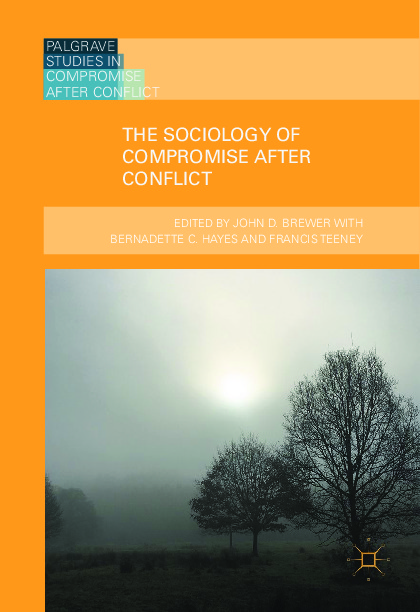File #2501: "2018_Book_TheSociologyOfCompromiseAfterC.pdf"
Testo
1|Series Editor’s Preface|7
1|Foreword|11
1|Preface and Acknowledgements|16
1|Contents|21
1|Notes on Contributors|23
1|List of Tables|27
1|1: Towards a Sociology of Compromise|28
2|Introduction|28
2|Compromise in Political and Moral Philosophy|32
2|Towards a Sociology of Compromise|36
3|Emotions as Performed Behaviour|38
3|The Public and Private in Sociology|40
2|Compromise Amongst Victims and Survivors of Conflict|43
2|Religious Eschatology and ‘Righteous Anger’|49
2|Conclusion|51
2|Bibliography|53
1|2: Victims and Compromise in Northern Ireland|57
2|Introduction|57
2|What Is Compromise?|59
2|Compromise as a Social Practice|62
2|Compromise Mediators|64
2|Social Networks|70
2|Conclusion|73
2|Bibliography|75
1|3: Trust as a Compromise Mediator in Northern Ireland’s Victim Support Groups|76
2|Introduction|76
2|Social Capital in Deeply Divided Societies|78
2|Trust in Northern Ireland’s Victim Support Groups|82
3|Victim Leaders|83
4|Timothy|83
4|Jack|85
4|Manny|86
3|Victims|88
2|Conclusion|95
2|Bibliography|99
1|4: Barriers to Trust in a ‘Peace Process Generation’: Ambivalence in Young Catholics in Northern Ireland|100
2|Introduction|100
2|Trust as a Compromise Mediator in Northern Ireland|102
2|Growing Up in a Divided Society|104
2|Young People in Northern Ireland Today|106
2|Methodology|109
2|Safety and Danger in Exclusive Communities|112
2|Encountering Others|114
2|Shared Spaces: Compromise in Mixed Spaces|117
2|Conclusion|121
2|Bibliography|123
1|5: Forgiveness and the Practice of Compromise in Post-apartheid South Africa|127
2|Introduction|127
2|On the Meaning of Forgiveness|128
2|Legacies of a Violent Past|130
2|Forgiveness as a Restorative Justice Approach|132
2|Methodology|135
2|Victims’ Understandings of Forgiveness|136
3|Religious Forgiveness|136
3|Secular Forgiveness|138
3|Forgiveness as Coping|141
2|Reciprocity in Interpersonal and Political Forgiveness|143
2|Forgiveness as Dynamic and Non-linear|146
2|Conclusion|148
2|Bibliography|151
1|6: Peace Religiosity and Forgiveness Among War Victims in Sri Lanka|153
2|Introduction|153
2|Religion and the Sociology of Compromise|154
2|Religion and Conflict in Sri Lanka|156
2|Peace Religiosity in the World Religions|159
3|Buddhism|160
3|Christianity|161
3|Hinduism|163
3|Interfaith Religious Culture in Sri Lanka|164
2|Forgiveness|165
2|Religious Resources for Forgiveness|172
2|Conclusion|176
2|Bibliography|178
1|7: The Road to Compromise in Sri Lanka|180
2|Introduction|180
2|The Human Cost of Sri Lanka’s War|182
2|Ethnic Relations in Sri Lanka|184
2|The Road to Compromise: Forgiveness, Memory and Hope|190
2|Amnesty and Truth Recovery|194
2|Conclusion|198
2|Bibliography|200
1|8: Compromise Without Virtue: Male Child Soldier Reintegration in Sierra Leone|202
2|Introduction|202
2|Translating the Official Compromise|204
2|Compromise and the Male Child Soldier|210
3|Concealers|211
3|Mitigators|216
3|Embracers|221
2|Compromise Without Virtue|224
2|Conclusion|226
2|Bibliography|227
1|9: Religious Emotions and Forgiveness in the Context of the Peace Process in Colombia|230
2|Introduction|230
2|Emotions, Religious Emotions, and Forgiveness|233
2|Emotions, Religious Emotions, and Political Forgiveness|234
2|Forgiveness in Bojayá|237
2|The Apology|242
2|The Black Christ and the Broken Christ|244
2|The Political Mobilization of Emotions|245
2|Conclusion|246
2|Bibliography|247
1|10: Conclusion: Afterword on the Sociology of Compromise|252
2|Introduction|252
2|A Conceptual Assessment|253
2|An Empirical Assessment|259
3|Victims as Moral Beacons|259
3|A New Empirical Agenda|264
2|Conclusion|274
2|Bibliography|278
1|Bibliography|280
1|Index|298
1|Foreword|11
1|Preface and Acknowledgements|16
1|Contents|21
1|Notes on Contributors|23
1|List of Tables|27
1|1: Towards a Sociology of Compromise|28
2|Introduction|28
2|Compromise in Political and Moral Philosophy|32
2|Towards a Sociology of Compromise|36
3|Emotions as Performed Behaviour|38
3|The Public and Private in Sociology|40
2|Compromise Amongst Victims and Survivors of Conflict|43
2|Religious Eschatology and ‘Righteous Anger’|49
2|Conclusion|51
2|Bibliography|53
1|2: Victims and Compromise in Northern Ireland|57
2|Introduction|57
2|What Is Compromise?|59
2|Compromise as a Social Practice|62
2|Compromise Mediators|64
2|Social Networks|70
2|Conclusion|73
2|Bibliography|75
1|3: Trust as a Compromise Mediator in Northern Ireland’s Victim Support Groups|76
2|Introduction|76
2|Social Capital in Deeply Divided Societies|78
2|Trust in Northern Ireland’s Victim Support Groups|82
3|Victim Leaders|83
4|Timothy|83
4|Jack|85
4|Manny|86
3|Victims|88
2|Conclusion|95
2|Bibliography|99
1|4: Barriers to Trust in a ‘Peace Process Generation’: Ambivalence in Young Catholics in Northern Ireland|100
2|Introduction|100
2|Trust as a Compromise Mediator in Northern Ireland|102
2|Growing Up in a Divided Society|104
2|Young People in Northern Ireland Today|106
2|Methodology|109
2|Safety and Danger in Exclusive Communities|112
2|Encountering Others|114
2|Shared Spaces: Compromise in Mixed Spaces|117
2|Conclusion|121
2|Bibliography|123
1|5: Forgiveness and the Practice of Compromise in Post-apartheid South Africa|127
2|Introduction|127
2|On the Meaning of Forgiveness|128
2|Legacies of a Violent Past|130
2|Forgiveness as a Restorative Justice Approach|132
2|Methodology|135
2|Victims’ Understandings of Forgiveness|136
3|Religious Forgiveness|136
3|Secular Forgiveness|138
3|Forgiveness as Coping|141
2|Reciprocity in Interpersonal and Political Forgiveness|143
2|Forgiveness as Dynamic and Non-linear|146
2|Conclusion|148
2|Bibliography|151
1|6: Peace Religiosity and Forgiveness Among War Victims in Sri Lanka|153
2|Introduction|153
2|Religion and the Sociology of Compromise|154
2|Religion and Conflict in Sri Lanka|156
2|Peace Religiosity in the World Religions|159
3|Buddhism|160
3|Christianity|161
3|Hinduism|163
3|Interfaith Religious Culture in Sri Lanka|164
2|Forgiveness|165
2|Religious Resources for Forgiveness|172
2|Conclusion|176
2|Bibliography|178
1|7: The Road to Compromise in Sri Lanka|180
2|Introduction|180
2|The Human Cost of Sri Lanka’s War|182
2|Ethnic Relations in Sri Lanka|184
2|The Road to Compromise: Forgiveness, Memory and Hope|190
2|Amnesty and Truth Recovery|194
2|Conclusion|198
2|Bibliography|200
1|8: Compromise Without Virtue: Male Child Soldier Reintegration in Sierra Leone|202
2|Introduction|202
2|Translating the Official Compromise|204
2|Compromise and the Male Child Soldier|210
3|Concealers|211
3|Mitigators|216
3|Embracers|221
2|Compromise Without Virtue|224
2|Conclusion|226
2|Bibliography|227
1|9: Religious Emotions and Forgiveness in the Context of the Peace Process in Colombia|230
2|Introduction|230
2|Emotions, Religious Emotions, and Forgiveness|233
2|Emotions, Religious Emotions, and Political Forgiveness|234
2|Forgiveness in Bojayá|237
2|The Apology|242
2|The Black Christ and the Broken Christ|244
2|The Political Mobilization of Emotions|245
2|Conclusion|246
2|Bibliography|247
1|10: Conclusion: Afterword on the Sociology of Compromise|252
2|Introduction|252
2|A Conceptual Assessment|253
2|An Empirical Assessment|259
3|Victims as Moral Beacons|259
3|A New Empirical Agenda|264
2|Conclusion|274
2|Bibliography|278
1|Bibliography|280
1|Index|298

